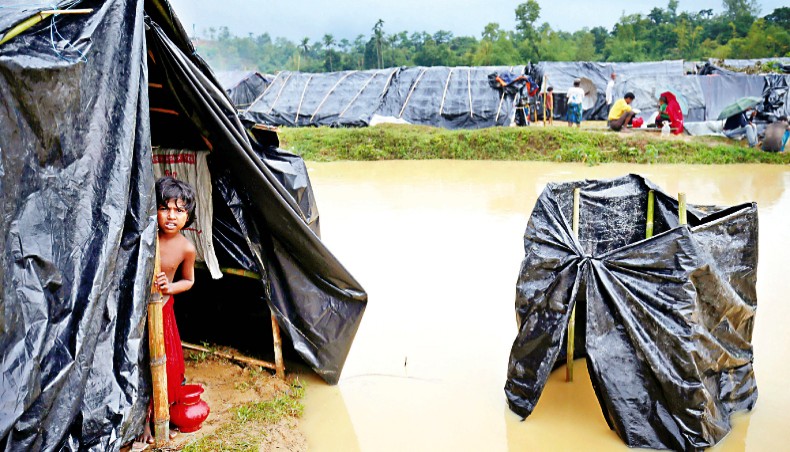Rain worsens plight of Rohingyas
Thousands of Rohingyas massed in makeshift camps in Cox’s Bazar after fleeing ‘ethnic cleansing’ in Myanmar passed a sleepless night as heavy rain beginning from Saturday swamped their shelters making the places filthy and aggravating their struggle for survival.
Torrential rain heaped new misery on the Rohingyas, who continued struggling for survival with shortage of food and safe drinking water.
Overnight heavy rain caused by a low formed over coastal regions of Bangladesh that continued till Sunday noon also decreased the local people’s relief work for over 4 lakh Rohingyas who fled violence in Rakhine State of Myanmar that began on August 25.
Met office in Dhaka recorded 100mm rainfall in Cox’s Bazar between Saturday night and Sunday noon, when in general, 50mm or above rainfall in a day caused stress on local drainage system leading to localised flood.
The met office predicted more rainfall in the area for today because of low and advised authorities concerned to hoist local cautionary signal 3 for maritime ports of Chittagong and Cox’s Bazar.
Cox’s Bazar additional district magistrate Khaled Mahmud, also the focal person on Rohingya issue, said that the rain hampered relief works for Rohingyas and construction of camps. He said that the district administration operated four mobile courts aiming to bring all Rohingyas in the new camp at Balukhali of Ukhia upazila.
Cox’s Bazar civil surgeon Abdus Salam said that their vaccination programme for Rohingya children was hampered on Sunday. ‘The rain would increase the number of patients at already overcrowded health facilities,’ he warned.
‘This is a horrible condition … women and children are worst sufferers of the rain,’ International Organisation for Migration Asia-Pacific region spokesperson Chris Lom said while visiting Khayenkhali area of Ukhia that was inundated by rain water.
UN agencies said that 4.12 lakh Rohingyas entered Bangladesh in the past three weeks. Bangladesh foreign ministry officials estimated that the number of new and old Rohingya entrants crossed 8.30 lakh.
The UNHCR and the IOM expressed fear that the new influx might take to 10 lakh the number of Myanmar nationals in Bangladesh.
The ongoing ethnic cleansing began in Rakhine on August 25, when Arakan Rohingya Salvation Army reportedly attacked dozens
of police posts and checkpoints and one military base in Rakhine and Burma army launched the ‘clearance operation.’
The Rohingyas are a stateless ethnic minority in Myanmar not allowed to exercise their basic rights including the freedom to move, right to education, work and other social, civil and political rights.
Hundreds of Rohingyas continued to enter Bangladesh crossing the River Naf and different land border points on Sunday amid rain.
Rohingyas were now living here and there making makeshift shelters beside roads and highways, cutting hills and forests in bordering areas in Cox’s Bazar and Bandarban.
Rohingays flooded sides of Cox’s Bazar-Teknaf road and the Marine Drive making makeshift shelters with plastic sheet. Similar reports poured in from Rohingyas taking shelter at Balukhali and Kutupalang of Ukhia and Shamlapur and Shah Parir Dwip and Sabarang.
Rohingyas said that heavy downpour left their shelter places flooded within five minutes of rain and submerged the place with filthy water as open defecation were common in absence of proper sanitation facilities.
They said that at the night they took shelter on the middle of roads, comparatively high open places while many others virtually passed their time on foot. Many parents kept their infants in their lap in futile attempt to save them from rain water.
Rohingyas stranded along border at Naikhyangchari were worst sufferers of the rain. Many claimed that their daily necessary items including kitchen utensils were washed out by the rain.
Rain waters inundated a large portion of Khayenkhali and low lying areas of Balukhali, drenched and mudded almost all roads. At Khayenkhali, Rohingya Hamid Hossain said that they took shelter on the road or high land during the rain in the night but they had to leave the places in the morning and stay at the inundated places.
‘Hundreds of us were standing on foot during the rain,’ said Rohingya woman Henoara who was found on the heavily mudded Palungkhali shrimp enclosure embankment.
Both said that they received no relief on Sunday which aggravated their sufferings.
It was unknown that how many Rohingyas were staying in open places including roadsides.
UN agencies said that about 1,58,000 new arrivals took shelters at Balukhali, Kutupalang, Ledha and Shamlapur makeshift camps and Kutupalang and Nayapara refugee camps.
About 2,33,000 took shelter at spontaneous shelters at Mainar Ghona, Thangkhali, Unchiprang and Hakimpara of Cox’s Bazar and 21,000 at places of host communities at Teknaf and Ukhia.
Numerous, small, ad hoc aid distributions continued in an uncoordinated manner causing safety and security issues and congestion on the roads, said international aid agencies
More than 600,000 Rohingya children might be in Bangladesh by the end of the year, said Save the Children country director in Bangladesh Mark Pierce in a statement on Sunday.
‘Many people are arriving hungry, exhausted and with no food or water, having left their homes in fear of their lives. I’m particularly worried that the demand for food, shelter, water and basic hygiene support is not being met due to the sheer number of people in need. If families can’t meet their basic needs, the suffering will get even worse and lives could be lost,’ he said.
The humanitarian response needs to be rapidly scaled up, and that can only be done if the international community steps up funding, he added
News Courtesy: www.newagebd.net











